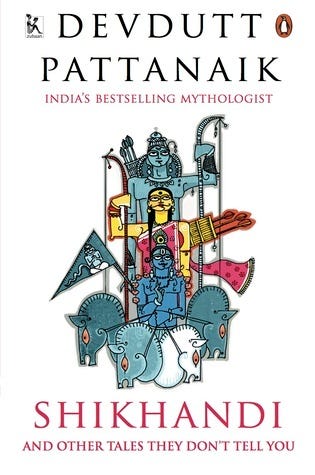Shikhandi and Other Stories They Don't Tell You by Devdutt Pattanaik
Genre: Non-fiction / Mythology
Rating: 2 stars
“Patriarchy asserts men are superior to women. Feminism clarifies women and men are equal. Queerness questions what constitutes male and female”
Shikandi and Other Stories They Don’t Tell You (SAOSTDT) is Devdutt Patnaik’s attempt to explore the existence of queerness in mythology and erase the misconception that it has been introduced to us because of Western influence. To give credit where it is due, Patnaik’s book is thoroughly researched, and the 30 stories are sourced not only from the Puranas or epics like the Mahabharata but also from folklore, oral traditions and regional temple stories.
Mythology has always been handed to us in sanitised packages, and certain aspects of our stories have been eliminated or covered up. The idea of a status quo and people that stray away from it is something that never existed in our mythology and is alien to us, just like the infamous Section 377. Patnaik aims to prove that mythological stories- Hindu, Jain, Buddhist, Greek, Roman, etc.- have always been comfortable with going beyond the ideas of man and woman, exploring the spectrum of sexuality and characters that refused to be labelled. However, how far he goes in achieving this goal is debatable.
The book seemed like a stack of notes that Patnaik published without stringing them together into a whole. While his writing is simple and digestible, it is the lack of effort in this book that did not sit well with me. The stories are short, and each one ends with a list of his observations, written in a manner that made me doubt whether he himself was convinced about his reasoning. Neither was there any cohesiveness when it came to the stories. I could have read each chapter separately and would have never guessed that they came from the same book. Each character and tale that he explores in this short book could be fleshed out into gripping stories. But he leaves us with just a teaser.
Another thing that really stuck out to me was his lack of a stand. Patnaik refuses to comment on his ideology or belief but instead delivers the story in an off-handed manner as if he is saying to the reader, “Here are the stories I am narrating, make what you want of them.” Instead of thought-provoking insights, he ends with questions meant to get the readers to think. I was just left frustrated.
SAOSTDT (What a long name!) is either a great idea gone astray or a ploy to attract readers without putting in the work. The artwork in the book, its size and my unwillingness to DNF a book are the only things that kept me going. Either way, the book left me disappointed and with a strong urge to pick up better books about Shikandi, the character from the title of the book.
“In the Veda, there is a line ‘vikruti evam prakruti’ which can be translated as ‘all things queer are also part of nature’.”
What a powerful book this would have been if Patnaik had delved further into such ideas and brought the stories together.

